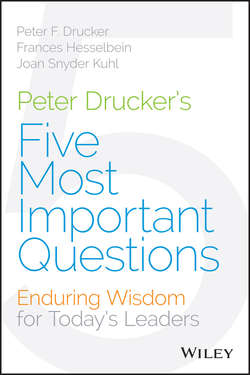Читать книгу Peter Drucker's Five Most Important Questions - Peter F. Drucker - Страница 5
Introduction
ОглавлениеCreating Enduring Wisdom for Today's Leaders
Peter F. Drucker often asked those he worked with a simple question: “What do you want to be remembered for?” At the Frances Hesselbein Leadership Institute, we unanimously agree that it's vitally important that we play a role in inspiring the next generation of leaders. In 2009, the Hesselbein Institute partnered with the University of Pittsburgh to launch the Hesselbein Global Academy for Student Leadership and Civic Engagement, which has already convened 300 talented students from every continent and exposed them to Peter F. Drucker's and Frances Hesselbein's work.
Today's youngest generation – known as the Millennials or Generation Y, born between 1980 and 2000 – are not only the largest generation yet but also the most educated and most diverse. The reach of technology and ease of global travel have magnified the creativity of their dreams in many ways. The digital and social media movement from traditional cable to Facebook and Twitter put them in touch with the rest of the world where they can wear, consume, and interact with global brands and causes in new and unprecedented ways. They developed networks of friends who were not neighbors or in their gym class but from faraway parts of the world. They may never meet these friends face to face, yet the connections are highly influential upon their lives. They have developed a global sensibility, which is why I often refer to Millennials as the first global generation.
The young leaders we meet are driven, generous, and globally minded self-starters. They see the world differently, with a relentlessly positive attitude. At the same time, they are facing record unemployment and underemployment, and they feel very misunderstood in the workplace and media.
What we have learned is that Millennials are craving guidance, simple tools, and mentors to help them focus, achieve their potential, and pursue their dreams of making a difference in the world. Which brings us to this book. Is Drucker's management philosophy still relevant to today's young talent and tenured leadership? Yes! Can it make a difference? We've seen it happen. It's hard to believe that words written in the mid-twentieth century might still be applicable to today's business challenges and opportunities, but we provide examples throughout the book to prove just that.
Drucker says that “self-assessment is the first action required of leadership,” so it makes sense that the five questions tool is read by young talent who are on the path to one day leading organizations, and re-read by experienced leaders in diverse sectors. This basic framework has served leaders in every sector for decades and is the perfect companion for Millennials and management today. Our contributors shine a light on several examples of how the self-assessment process can serve any purpose and stimulate progress.
The war for global talent is in full swing. Executives and organizations in every sector are looking for strategies to amplify the productivity of their younger workforce and grow their skills toward sustainable leadership. Our hope in launching this new edition is to build awareness and cultivate a new community of Drucker fans who will communicate using this basic language of The Five Questions. This can also be a foundational tool for new-manager and leadership-development programs. Drucker's thought leadership can serve as a universal, collaborative platform for developing ideas and strategic plans within a multigeneration team in any environment and sector. Just the act of reflecting on Drucker's influential insights can promote the kind of dialogue that will bring your team closer together and bridge the common communication gap between the different generations.
Millennials are committed to the success of the social sector, and we have found college students are volunteering all over the globe. In one of my national research studies of college students, 70.0 percent of freshmen and 79.1 percent of juniors and seniors reported volunteering while in college.2 The Millennial generation will continue to seek opportunities to connect the mission of nonprofit organizations to for-profit partners. Great leaders “think of the needs and the opportunities of the organization,” Drucker wrote, “before they think of their own needs and opportunities.”
As a mentor to undergraduate and master of business administration (MBA) students, I've observed a dramatic shift in their expectations and anxieties regarding postcollege career opportunities. The financial crisis led many companies to change their workforce dramatically, which deflated the sense of security most employees associate with the larger companies. MBA graduates today are becoming more selective in their postgraduate pursuits and setting their sights on new ventures that allow them more responsibility and where they perceive they will gain a deeper understanding of the enterprise. Business schools are encouraging the swelling interest in start-ups through business plan competitions and new media and venture-related courses.
More Millennials are starting businesses than any previous generation, fleeing cubicles in corporate America to launch their passion projects. According to Bloomberg, 8 out of 10 entrepreneurs who start businesses fail within the first 18 months. In many cases, failure is because of lack of focus in the business strategy, along with a lack of funding. To garner investment and support from others, you must demonstrate core knowledge and laser focus for your business. What better way to build your business than to use the five questions self-assessment tool as your foundation?
Конец ознакомительного фрагмента. Купить книгу
2
Barnes & Noble College collaborated with Why Millennials Matter for a national study on the college student's mind-set related to career motivators, influences, and skills for success, www.bncollege.com/news/understanding-the-millennial-mindset.
